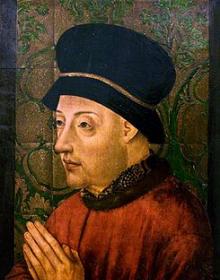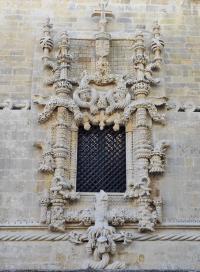- HOME
- MONUMENT
- Convent of Christ
- History
- Architecture
- Personalities
- King Afonso Henriques
- D. Gualdim Pais
- King Dinis
- King John I
- D. Lopo Dias de Sousa
- King Duarte
- Prince D. Henrique (Henry
- King John II (1455 - 1495
- King Manuel I (1469 - 152
- Diogo de Arruda
- João de Castilho
- Jorge Afonso
- Olivier de Gand
- King John III (1502 - 155
- Diogo de Torralva
- Friar Anthony of Lisbon
- Baltazar de Faria
- Filipe Terzi
- Philippine Dinasty
- King Philip II of Spain
- King John IV
- Domingos Serrão
- Queen Mary II
- Prince Fernando
- Costa Cabral
- Artisans and Artists
- Intangible Heritage
- Related Heritage
- Glossary
- VISIT OUR MONUMENT
- HERITAGE LEARNING
- TOMAR
- MONASTERIES ROUTE

King John I (1357 - 1433)
Tenth King of Portugal and the first of the Avis dynasty, with the cognomen O de Boa Memória (The One with Good Memory), King John I was born on April 11th , 1357. Son of King Pedro I and Teresa Lourenço - young daughter of a Lisbon merchant, Lourenço Martins, from a very young age, his father instructed the Commendator of the Avis Order to teach him.
In 1383 when the wedding between infanta D. Beatriz and D. João I of Castille takes place, the Avis Master is already one of the richest men in Portugal. After the passing of King Fernando, a troubled period of war with Castille begins due to problems in the dynastic succession - this is reflected in the political and social instability that occurred across Portugal at the time.
The Avis Master - a skilled politician - manages to congregate much support in his ascension to the throne especially with allies such as João das Regras and D. Nuno Álvares Pereira. He goes to war against D. João I of Castille, defeats him in the Aljubarrota battle and is declared king of Portugal by the Coimbra Assembly Courts in 1385. King John I then weds the daughter of the Duke of Lancaster, D. Filipa, in 1387, and had 10 sons, thus initiating the Avis dynasty.
He conquers Ceuta in 1415 - a strategic point for sailing in northern Africa - and begins the Portuguese overseas expansion. His sons, Princes D. Duarte, D. Pedro e D. Henrique - the three oldest brothers - are knighted.
Of these, D. Henrique (Henry, the Navigator) is historically considered the most notable for his work and as a strategist behind the expansion period of Portugal in its age of Discoveries.
D. Henrique was nominated Governor of the Order of Christ by influence of King John I. This connection resulted in very close ties between this military and religious order and the Portuguese Royal House.
King John I passed away in 1433 and was buried - alongside his parents - at the Santa Maria da Vitória da Batalha Monastery, erected during his ruling to celebrate the Portuguese victory in the Aljubarrota battle.
SERVICES - ACTIVITIES



